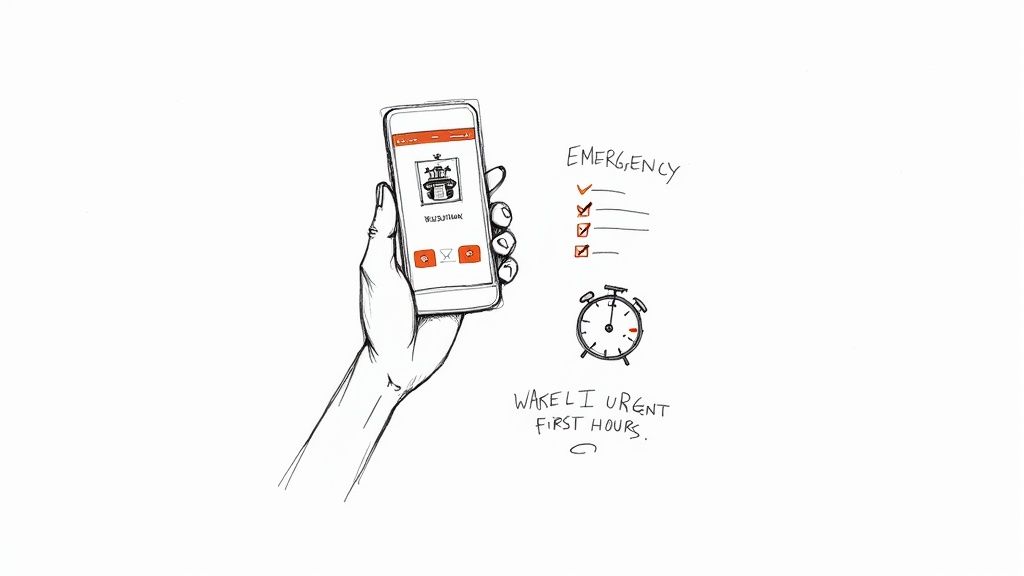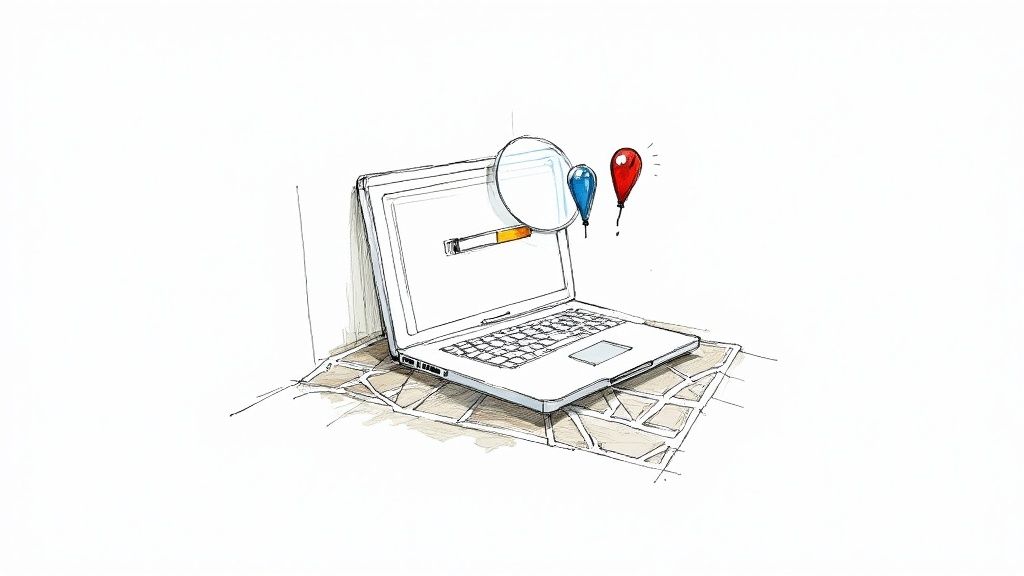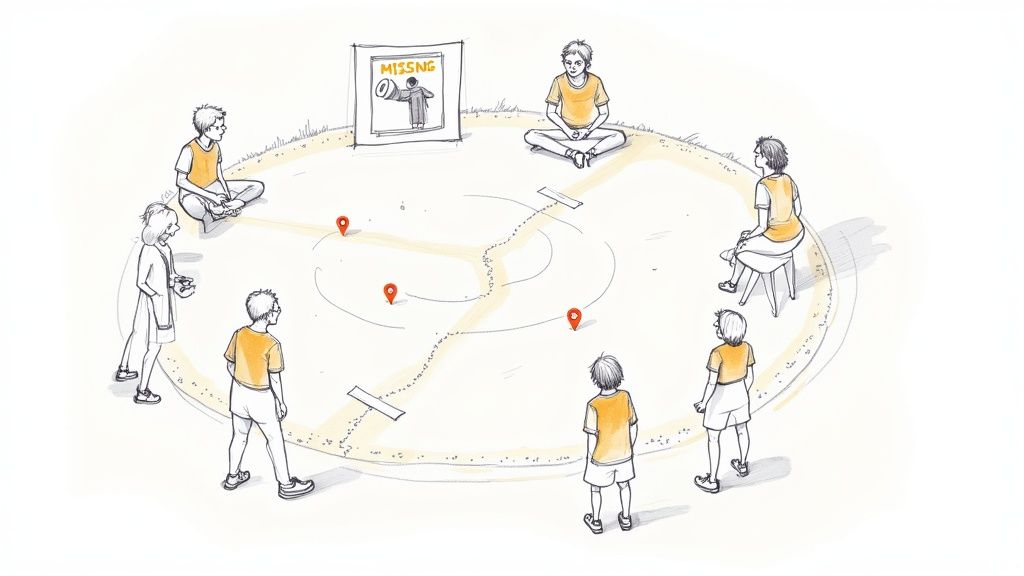When someone you care about goes missing, every second feels like an eternity. The first few hours are absolutely crucial, and knowing what to do can make all the difference. Your immediate priority is to file an official report with the police. Don't hesitate.
From there, you'll need to gather essential information about their last known movements and get in touch with their close friends and family to create a support network. Time is your most critical asset, so acting with speed and clarity is paramount.
The Critical First 24 Hours

That initial wave of panic and uncertainty is completely normal. The single most effective way to channel that energy is to contact the police straight away. There’s a persistent and dangerous myth that you have to wait 24 hours before you can report someone missing in the UK—this is completely untrue. The sooner law enforcement is involved, the better their chances of finding fresh leads.
This isn't a rare problem. In the UK, over 170,000 people are reported missing every year. This translates into approximately 330,000 separate missing person incidents that police forces have to investigate annually, which really underscores why giving them clear, concise information from the very beginning is so vital. You can get a sense of the scale of the issue from recent parliamentary discussions on missing persons.
Filing The Official Police Report
When you make that call, be ready to give a detailed and factual account. Having this information organised beforehand will streamline the process and give the investigating officers the solid foundation they need to get started.
This report is what officially kicks off the investigation. For a more detailed walkthrough of what to expect, have a look at our guide on how to file a missing person police report.
A crucial tip: Don't downplay your concerns. If you genuinely believe the person is at risk—perhaps due to their age, a health condition, or their mental state—make this crystal clear. This context is vital for the police to assess the urgency and assign the right resources.
To help you stay focused during these incredibly stressful first hours, here's a checklist of the most important actions to take.
Immediate Action Checklist
This table summarises the critical tasks to tackle immediately after realising someone is missing. Organising this information will provide immense help to the police and your own search efforts.
| Action | Why It's Critical | Information to Prepare |
|---|---|---|
| Contact Police | Officially starts the investigation and mobilises resources. | Full name, date of birth, physical description, recent photo, last known location. |
| Notify Inner Circle | Friends and family may have seen or heard something recently. | Create a contact list (phone numbers, emails) of close friends, family, and colleagues. |
| Secure Their Space | The person's room or home contains potential clues. | Leave their room, laptop, and personal belongings completely untouched. |
| Compile Digital Info | Their online activity can reveal their plans or state of mind. | List all known social media profiles, email addresses, and phone numbers. |
| Check Financials | Bank activity can create a real-time digital breadcrumb trail. | If you have legal access, look for recent transactions or cash withdrawals. |
Taking these practical, organised steps helps you focus your energy where it matters most. It builds a strong foundation for the search and makes sure no critical details are lost in the chaos.
Gathering Key Information Yourself
While the police launch their formal inquiry, there's a lot you can do to preserve evidence and coordinate with others. Think of it as creating a central hub of information for everyone involved.
A few immediate tasks come to mind:
- Preserve their room and belongings. It’s tempting to want to tidy up, but don't. Avoid cleaning or moving anything in their home or room. Their computer, any notes left out, or even items in the bin could hold vital clues about their plans or emotional state.
- Reach out to key people. Make a list of their closest friends, work colleagues, and family members. Start contacting them to ask when they last spoke to the person and what was said.
- Collate their digital footprint. Put together a list of all their known social media accounts (Facebook, Instagram, X, etc.), email addresses, and phone numbers. This digital trail is often one of the most valuable resources for investigators.
Building Your Information Toolkit

After you've filed the initial report, your focus should shift to gathering every scrap of information you can about the missing person. You're essentially building a central intelligence file. This becomes the single source of truth for the police, any private investigators you hire, and your own search efforts.
When everything feels chaotic, having a well-organised information pack is your anchor. It ensures that critical details don't get lost in the stress of the moment and that everyone involved has the same facts.
Creating a Physical and Digital Snapshot
First things first, you need to build a clear picture of who you're looking for, both in the real world and online.
Start with physical identification. Pull together as many recent, high-quality photos as you can find. You'll want clear headshots from different angles, but also full-body pictures that show their build and how they carry themselves. Alongside these, jot down a precise physical description: height, weight, hair and eye colour, and any unique features like scars, tattoos, or distinctive piercings.
Next, you need to map out their digital footprint. So much of our lives happens online, and this trail can offer powerful clues about a person's mindset, recent activities, or even where they might be.
Compile a detailed list of their online presence:
- Social media accounts: Think beyond the obvious. List their Facebook, Instagram, X (formerly Twitter), TikTok, and LinkedIn, but also any niche platforms they might have used.
- Email addresses: Include both their personal and work accounts.
- Known usernames: People often reuse the same handle across different websites. This can be a brilliant way to uncover accounts on forums or gaming sites you didn't know about.
- Phone numbers: Their main mobile number is crucial, but don't forget any secondary or old numbers they might still have access to.
The aim here is completeness. What might seem like an irrelevant detail—an old username from a gaming forum, for instance—could be the very thing that gives investigators a new lead to follow.
Documenting Routines and Relationships
With a solid profile established, it’s time to add the human element. You need to document the rhythm of their life.
What did their typical day or week look like? Think about their work schedule, the gym they went to, their favourite coffee shop, or the route they always took for a run. This information creates a baseline, helping investigators spot what's out of the ordinary.
Just as important is their network of relationships. Make a list of their close friends, family members, colleagues, and anyone they were recently involved with. Were there any strange conversations or shifts in their mood or behaviour lately? Anything that seemed out of character could be significant.
Pulling all these threads together can be a lot to handle on your own. Sometimes, a professional eye is what's needed to see the connections. Understanding how experts trace a person in the UK can show you how these pieces of information are used in a real investigation. This organised dossier is the single most powerful tool you can give yourself and the police to make the search more strategic and focused.
Using Digital Tools in Your Search
In this day and age, a person's digital footprint can be just as revealing as their physical one. Tapping into their online life can unearth a wealth of clues, supplementing the official police investigation and giving you a much clearer picture of their recent movements and state of mind. It’s all about being methodical and knowing where to look without stepping over any legal or ethical lines.
I always advise starting broad before you start drilling down. Kick things off with a simple search engine query using different combinations of the person's name, known usernames, and locations. Think along the lines of “John Smith” + “Manchester” + “recent activity”. If they were a gamer, try their gamer tag paired with the names of online forums they were active on.
Social media is often where you'll find the most immediate information. Scour their profiles for recent posts, comments, or location check-ins. It's also worth looking at who they’ve recently become friends with or what public groups they've joined. Don't just stick to the big players like Facebook and Instagram; consider niche platforms tied to their hobbies, like Strava for a keen cyclist or Goodreads for an avid reader.

Charities like Missing People are an absolutely essential resource. They do incredible work publicising cases and offering guidance when you need it most. Their website acts as a central hub for official appeals and solid advice for families, showing just how powerful a coordinated digital campaign can be.
Advanced Digital Search Techniques
If you want to dig a little deeper, you can explore some basic open-source intelligence (OSINT) methods. This is simply the practice of using publicly available information to piece together a digital puzzle.
- Reverse Image Searches: Take a clear photo of the person and run it through tools like Google Images. You’d be surprised how often this can uncover profiles on websites you never knew existed.
- Username Checks: People are creatures of habit. If you know one of their usernames, use a checker service to see if that same handle appears on other social or gaming platforms. It’s a simple way to follow a digital trail.
- Following Up on a Phone Number: A mobile number can sometimes be linked to social media accounts. For a professional perspective on this, our guide on tracing telephone numbers in the UK explains how this sensitive area is approached.
A word of caution: always act ethically. The goal is to find clues directly related to their disappearance, not to pry into unrelated private matters. Make sure you document everything you find—URLs, screenshots, the lot—and hand it all straight to the police.
Exploring Other Avenues
Don't get tunnel vision and focus only on social media. Public records, local news archives, and even community forums can hold vital pieces of information. A seemingly insignificant mention in an online community group or a comment on a news article could be the tiny lead that cracks the case open for the police.
Technology is constantly evolving, and for searches in difficult terrain, the use of drones for rescue operations is becoming more common. While this is something for the official search teams, it shows the incredible range of tools now available. Your job is to handle the digital groundwork—systematically gathering verifiable information that supports the professionals and helps bring your loved one home.
Organising a Community Search Effort

While the police are handling the official investigation, rallying the local community can dramatically amplify your search. A well-run volunteer effort keeps the missing person's face and story front and centre, often generating vital local leads that might otherwise be missed. The trick is to structure this effort so it supports the police, rather than getting in their way.
The very first thing you need to do is nominate a single point of contact. This one person will be the sole liaison with law enforcement. It’s a simple but crucial step that stops the police from being swamped with calls from well-meaning volunteers and ensures any new information is channelled correctly. This coordinator can also take charge of volunteer rotas, assigning search areas, and handing out materials like flyers and maps.
Designing Effective Missing Person Flyers
A missing person flyer can be an incredibly powerful tool, but its effectiveness hinges entirely on getting the details right. It needs to be clear, simple, and grab attention from a distance.
Make sure every flyer includes these essentials:
- A clear, recent headshot: This is non-negotiable and the most vital part of the flyer. The photo must be high-quality, with their face easily visible.
- Key details: Include their full name, age, height, build, and the colour of their hair and eyes.
- Distinctive features: Mention anything that might help someone identify them, like noticeable tattoos, scars, or piercings.
- Last known details: Pinpoint the date, time, and specific location they were last seen, plus a description of the clothes they were wearing.
- Official contact information:Always direct people to the police station handling the case, providing the official incident number. You should never put your personal mobile number on a public flyer.
Once your flyer is ready, think strategically about where to put them. Focus on high-traffic spots like local shops, post offices, community centres, bus stops, and train stations. Always ask for permission before posting them up. It's also smart to target places the missing person frequented – their favourite pub, park, or regular walking route.
Coordinating Volunteers Safely
When you're managing a group of volunteers, clear communication and safety are everything. Before anyone heads out, gather everyone for a quick briefing to set some ground rules and explain what the objective is for the day.
Give each team a gridded map showing the specific areas you want them to cover. This methodical approach stops one area from being searched ten times while another is completely ignored. Make it a firm rule that volunteers must search in pairs or small groups; no one should ever be out searching alone. For more insight on timing your actions, it's helpful to understand when to report someone missing as the level of urgency shapes the appropriate response.
Safety is paramount. Instruct every volunteer that if they find anything that could be evidence, they must not touch it. Whether it's a piece of clothing or a wallet, they should leave it exactly where it is, secure the area, and immediately call the search coordinator, who will then pass the information on to the police.
Don't forget the local media. A short, factual statement prepared for local newspapers or radio stations can significantly widen your reach. By channelling the goodwill of your community into a structured and safe search, you build a powerful network all working towards one goal: bringing your loved one home.
Sustaining a Long-Term Search
When the initial flurry of activity dies down and the days bleed into weeks, the search for a missing person enters a new, challenging phase. What started as a sprint is now a marathon, one that demands incredible emotional endurance and a completely different strategy. The goal shifts from immediate action to sustaining momentum, ensuring the case doesn't go cold.
This is where persistence and adaptation become your most important tools. It's about settling into a sustainable rhythm for yourself and your support network, regularly checking in with law enforcement, and finding new avenues to keep your loved one's story alive. It’s a tough transition, but a necessary one.
Maintaining Contact and Momentum
Consistent, organised communication with the police is absolutely critical. Try to establish a single point of contact on the investigation team and agree on a realistic schedule for updates – maybe once a week. This respects their workload while ensuring you don't feel left in the dark.
Every time you speak with your contact, be prepared:
- A quick recap: Start with the case number and the missing person’s name.
- New information: Pass on any new tips you've received, no matter how minor they seem.
- Specific questions: Instead of a general "any news?", ask targeted questions. For example, "Have you had a chance to review the CCTV from the train station?" or "Did any new transactions show up on their bank records this week?"
This kind of structured communication positions you as a proactive partner in the investigation. It keeps the case fresh in their minds and makes every conversation productive, focusing on new leads rather than just rehashing old ground.
The hard truth is that while most missing people are found, some searches stretch on. The numbers show that 86% of missing adults in the UK are found within two days, but a small percentage become long-term cases. In fact, as of March 2022, there were over 5,200 people classified as long-term missing. You can find more detail in these key statistics on the Missing People charity website. This is why a long-term strategy is so vital.
Keeping the Case in the Public Eye
As time goes on, media and public attention will naturally fade. It falls to you to find respectful and creative ways to bring the search back into focus.
Think about organising events around significant dates, like a birthday or the anniversary of the disappearance. A community walk, a candlelight vigil, or a fresh push on social media can often generate new press coverage and remind people that the search continues.
It's also worth getting back in touch with local journalists who covered the story when it first broke. A follow-up piece from the family's perspective can be a powerful human-interest story, reminding the community that you still need their help.
At this point, many families begin to think about bringing in professional help. If you're weighing this option, it's important to understand how much private investigators cost to make a clear-headed decision. A long-term search is draining, both emotionally and financially. Looking after yourself and managing your resources is just as crucial as any other part of the search effort.
Common Questions When Searching for a Missing Person
When someone you care about disappears, the flood of questions can be overwhelming. The emotional stress makes it tough to sort through the legal, financial, and practical steps you need to take. Here, we tackle some of the most pressing concerns families have, giving you straightforward answers to help you navigate this difficult time.
These are the tough, real-world questions that come up, especially when a search stretches on.
Can I Hire a Private Investigator?
Yes, and many families do. Bringing a private investigator on board to work alongside the police is a perfectly valid and often highly effective approach.
The real advantage is focus. A private investigator is dedicated solely to your case. While the police are juggling countless other investigations, a private firm gives your search their undivided attention. They can often follow up on leads, interview people, and check out new information with a speed that overstretched public services simply can't match.
It’s vital, however, that you choose a reputable, properly licensed professional. Look for an agency with a solid track record in missing person cases, transparent fees, and strong references. A good investigator won’t replace the police; they’ll work with them, sharing any credible findings to support the official search effort.
What if an Adult Doesn't Want to Be Found?
This is an incredibly painful situation for any family. If the person is a legal adult who is able to make their own decisions, and they're found safe and well, their right to privacy is legally protected.
When the police find an adult who has chosen to disappear, their job is to make sure that person isn't in danger or being held against their will. Once they’ve confirmed the individual is safe and has deliberately cut contact, they must respect that person's wishes. The police will close the case and will be able to tell you that your loved one is safe, but they cannot legally force them to come home or even tell you where they are.
This is a harsh reality to face, but an adult's autonomy is protected by law. The police's duty is to ensure safety, not to force a reunion against someone's will.
How Can I Get Financial or Legal Help?
The ripple effects of a person going missing are huge, often creating serious financial and legal problems. Thankfully, there are dedicated UK organisations that can provide specialist support.
Charities like Missing People are an essential first call. They provide far more than just emotional support; they offer practical guidance on how to manage the situation and can connect you with a network of resources specifically for families of the missing.
For trickier issues like accessing bank accounts, paying mortgages, or looking after a property, you'll likely need formal legal authority. In England and Wales, the Guardianship (Missing Persons) Act 2017 was created for this very purpose. It allows you to apply to the court for a Guardianship Order, which gives you the legal power to manage your loved one’s financial life while they are gone. It’s a crucial tool to stop their affairs from unravelling during the search.
When you feel the official investigation has stalled or you need a dedicated team to follow every lead, UK Private Investigators can provide the focused, professional support your search deserves. Find out more about our discreet and effective missing person tracing services.

